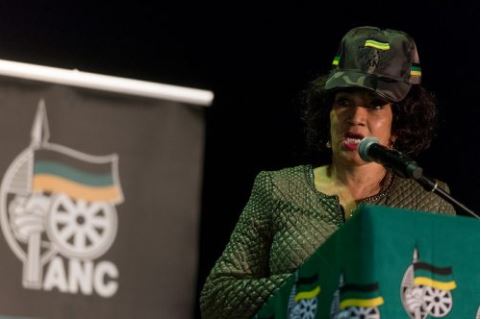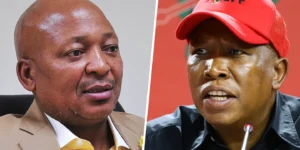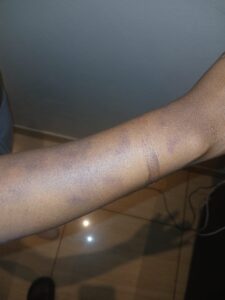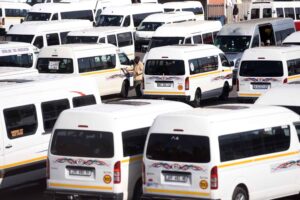By: Gillian Schutte
A response to Andile Zulu’s article in the Mail & Guardian.
When Minister Lindiwe Sisulu penned her article – Hi Mzansi, have we seen justice? – she made a bold public declaration of her ideological stance. This she did in the face of much danger, given the treacherous terrain of ANC factional politics. Here the powerful Ramaphosa/Mantashe/Gordhan faction wields the axe that seeks to destroy the purveyors of the ANC’s 54th National Conference resolutions. Labelled the RET camp, they are marked as subversives who need to be systematically politically executed.
So far we have witnessed the political demise of President Jacob Zuma, Ace Magashule, Busisiwe Mkhwebane and others at the hands of Ramaphosa – and though Black bodies, both dead and wounded, proliferate around him, he always finds a way to claim his innocence. It does not matter how glaring the evidence against him is – the weaponised Thuma Mina media cabal continues to market him as Mr Clean.
Lindiwe Sisulu, on the other hand, has remained resolute in the storm of a major backlash to her article. She has not backed down even when President Ramaphosa tried to force her hand by claiming publicly that she had agreed to apologise for her commentary on the judiciary as being somewhat populated with ‘non-White’ colonised judges, naming them more dangerous to the majority than the White oppressors.
Sisulu has stuck to her AK47, so to speak. She has soldiered on in the face of being hauled before the integrity commission in a shaming exercise to intimidate her into complacency. She has fired back decolonisation bullets with the precision of a freedom fighter at a recent meeting with the House of Lords – where she was hit with a barrage of loaded questions about her article critiquing the colonial nature of the judiciary and the constitution in South Africa.
The fact remains that Sisulu’s article resonated with many South Africans and did its job well – that being to shake people out of their complacency and spark widespread public debate. Though the Whitesplaining and vitriol directed at Sisulu cannot be recognised as any semblance of debate, many supported and engaged deeply with her call. So much so that the debate is still ongoing, some six months after it hit the press. Not even the valiant attempts of White media to rubbish her article and her persona, in an effort to crush any debate alternative to theirs, has been successful in stemming the enduring interest in her article.
The outrageous and toxic backlash to her article is not surprising. It’s the usual White-owned media’s hegemonic hubris and it was spewed at Sisulu by mostly White journalists. They did not hold back either. Their utter contempt and outright dehumanisation and disrespect came at her fast and furiously. The negative response was not only from Whites, however. It has also come from the My ANC camp as well as the affronted judiciary and some Black journalists.
One such journalist is Andile Zulu who, in his recent Mail and Guardian article, insists that most South Africans question Sisulu’s integrity. But who is he speaking for? Could it be that he has taken the conservative minority group views and Ramaphosa supporters as representative of all South Africans? Even if we added the lacklustre Left to this equation – does it signify, as his headline infers, all, or even most, South Africans?
This is not to imply that many of the questions he poses in his article are not pertinent. Rather it is the manner in which the questions are posed in is problematic.
Firstly, why signal out Sisulu alone? Is it because she is a woman and women are historically expected to explain themselves for daring to exert their positionality? We know that women are expected to work thrice as hard to gain leadership positions and Zulu’s article is, it seems, demanding she does just this. It is peppered with an off-putting mansplaining tonality that seemingly seeks to explain things to her as if she is devoid of self-reflection and critical knowledge.
He condescendingly tells Sisulu, from his man pulpit: “It is not the soundness of your arguments, or the righteousness of the causes you purport to support, that most South Africans question. It is the integrity of your political ambitions and the alignment of your material interests that deserve intense scrutiny. In other words, do you wield power towards the ends of justice for the destitute and vulnerable? Or, like most of the political elite, do you utilise power for self-enrichment and career advancement in service of this dysfunctional status quo?”
These, of course, are questions that only Sisulu can field, and this is the right time in her presidential campaign to share with South Africans her manifesto to this effect.
The problem for me, however, resides in Zulu’s claim to Sisulu that: “Through your demeaning of black senior judges in the judiciary, you indulge in race reductionism. It is a confusing feature of incoherent identity politics which seeks to explain political developments, social injustice and the behaviour of political agents primarily, and sometimes solely, through the analytical prism of race. To paraphrase the insights of Rekang Jankie, race reductionism is an over-reliance on race as an analytical tool for understanding and changing the world.
He adds: “To think that black people cannot act independently of “white power”, to assume that those who do not share your supposedly radical politics are race traitors, trivialises the agency of black people and cynically reproduces the racist presumptions you claim to be fighting against.”
Zulu’s postulation fits squarely into a liberal-conservative ideology which seeks to rubbish the notion that the meta-narrative of White economic and cultural supremacy continues to impact every aspect of African life. These views closely echo the sentiments of the post-race, free market pundits such as Jacques Rosseau and Michael Cardo, who rubbish identity politics as meaningless and confused, preferring to push an ahistorical view that eradicates the notion of racism, both social and economic, in favour of post-race individualism – an individualism that is sure to privilege those with the historical advantage of generational wealth and access to resources that remain unattainable to the African majority. The reductionism of Africans is a given in this White-washed framework and it is foolish to assert that the resistance to, and naming of White supremacy is where the reductionism lies.
Further, the structure of neoliberalism has been incubated in the West and via globalisation, forced onto developing countries. South Africa has become a veritable neoliberal laboratory, and it is this macroeconomic framework that has reinscribed the hierarchy of racism and White supremacy. It is, by design, a racist economic framework that forces the African majority deeper and deeper into the quagmire of poverty while it enriches the top 10%, the lion’s share of whom are White.
Like the hybrid of Roman-Dutch Law and English Common Law, inherited from colonial and apartheid times, it has little resonance for the majority of Africans. The Bill of Rights, contained in the constitution, is also underpinned by an enforced Free market premise which ensures that the elite has access to rights over and above the historically poor of this land. It goes even further in the brutal repressing of the uprisings of the poor of the land, in order to protect historically White-owned assets.
Of course, the question of whether the ANC willingly chose to adopt this anti-poor global neoliberal economic framework, or were forced to accept it at a time in history where both global and internal White capital pressure was at a peak, is still unresolved. Whatever the answer, it is the neoliberal economy that has resulted in an ANC that has certainly not delivered to the people.
One can rightly argue that the additional burden of corruption in government impacts negatively on adequate delivery to the poor and that the agency of the corrupt is fully intact when engaging in such deeds.
This is what Zulu seems to be pointing out to Sisulu as if Sisulu is not a Minister who has unmasked corruption and acted against it in all the ministerial positions she has held. She is also nowhere implicated in the Zondo Commission.
By implying that Sisulu is intrinsic to this corruption, Zulu does exactly what he purports not to do. He strips Sisulu of her agency by seemingly stating that as an ANC Minister she is incapable of asserting her own morals but is dictated to by the influences of the party she works for and is thus incapable of being not-corrupt.
Is this not a reductionist premise? Perhaps he ought to have done more research on the subject of his article.
Surely too, he recognises that even if the corruptor is a White person or business, it is the Black corrupt who are largely spotlighted in White-owned media and prosecuted by the judiciary, while White businesses found to be corrupt, are more often than not let off scotfree. Recent history bears witness to this. This is precisely because of the White social and economic metanarrative that continues to reign supreme in a post 94 South Africa.
To reiterate exactly how the Western/White economic system impacts wholly on global South governments and thus their citizens, let us turn to Noam Chomsky, who describes globalisation as “the result of powerful governments, especially that of the United States, pushing trade deals and other accords down the throats of the world’s people to make it easier for corporations and the wealthy to dominate the economies of nations around the world without having obligations to the peoples of those nations.”
In this system, the state is at the disposal of the free market economy and monopoly capital, which makes it a subordinate and ties up its ability to deliver that which serves the common good.
Progressive economist George Monbiot writes that “Neoliberalism is a self-serving racket that exempts billionaires and large corporations from the constraints of democracy, from paying their taxes, from not polluting, from having to pay fair wages, from not exploiting their workers.”
All of these issues impact most negatively the majority African population in South Africa, who often live downstream and downwind to these industrial monsters.
Neoliberalism is essentially capitalism without full democratic rights as state and citizen have increasingly become subsidiary to the marketplace. Intellectuals such as Manuela Cadelli have suggested that neoliberalism is a species of fascism because the economy has brought under subjection not only the government of democratic countries but also “every aspect of our thought”. She further argues that Neoliberalism takes on the form of nihilism, which “erases the ideals of universalism and humanistic values such as solidarity, fraternity, integration, respect for all and for differences.” Workers are stripped of worker security and forced into casual labour while education, health and social services are privatised and commodified. And all this is so that the top 10% can wring profits out of the rest of us. Even human misery is profitable.
That we have a President who is one of the few Africans to be part and parcel of the top 10% – or the 1% Billionaire’s Club, and who favours big business and profits over the majority, is where the problem lies and it may be that Zulu’s questions and critique should have been addressed to Ramaphosa instead of Sisulu. A source close to Sisulu has informed me that she has no shares or interests in the mining industry nor in any White-owned business. Indeed, she is also marked as being ‘not a friend’ of the Stellenbosch cabal precisely because she is critical of neoliberalism, as well as the fact that she has boldly picked up the mantle of propoor ideology and spoken unapologetically on this matter.
By now we should all have learned, Zulu included, that speaking publicly about the psychological, spiritual, economic and libidinal economy of the Black majority is very unsettling to colonists – be they big business fat cats, journalists for the White media, ordinary liberals or far right-wing White supremacists. This is because in the White imaginary it is they alone who can endow Africans with humanity – though it must be humanity that fits into the straight jacket of White neuroses and fear of Blackness.
Further, the humanisation of the African results in the knowledge that Africans have the same needs and should have the same access to rights as Whites. This is untenable to them because what it means is that the usurpation of Africans has to be undone. It means sharing wealth and land. It means giving up the embodied notion that Whites have the first and last say on everything from their God-given higher rung on the historical scheme of who is more human according to the false construct of race. This is where their resistance to the African subject as ‘not-a-subject but fully human’, lies.
Thus, a perfectly sound article such as Sisulu’s, that speaks of the legitimate issues of landlessness and lack of economic security, as well as the impact of colonisation and usurpation on the psyche of the majority African population, in the framework of injustice and a colonised justice system, becomes a major threat to Whites in general. It is their backlash that is reductionist, not the message. It is also threatening to the colonised African, who perhaps feel that their world would crumble without the embedded parameters of Whiteness to which they have become so well adapted and from which they benefit.
Many will continue to call Sisulu arrogant, or reductionist when she stands her ground. But she has done the work. Hers is a lived experience in the history of usurpation and colonisation. She speaks of being sent to a boarding school in Swaziland as a young girl where Blacks and Whites were housed in separate boarding houses. She remembers having to wake up early to make the White girl’s beds and wash their socks. She speaks of being made to peel vegetables for the White kid’s meals while the Black kids were fed pap and substandard protein. She lived the reality of being separated from her parents, Albertina and Walter Sisulu, who were at the forefront of the struggle for African emancipation from apartheid. As a result, she grew up without her parents’ presence, in a constant state of bereavement for their loss and anxiety for their safety. Her father was incarcerated on Robben Island for 26 years and her mother was in solitary confinement between 1981 and 1985, after which she had all sorts of bans imposed on her for many years. Lindiwe Sisulu herself was also jailed by the apartheid police.
This stress, strife and heartbreak, it seems, cannot be fully understood by those who belong to the oppressor class. Why else would a journalist such as Rebecca Davis of the Daily Maverick, write so disparagingly and hatefully about Sisulu and why would Zulu feel the need to signal her out as not being trustworthy? They, seemingly, cannot conceive of the passion for justice rooted in suffering, that drove Sisulu to give up her studies to become a fully decorated MK soldier, including the Red Star award from Russia. Rather, this history has been whittled down and essentialised. When these journalists write about Sisulu it is with a sense of innate White or Male superiority. They wilfully attempt to eviscerate her ontology by, for example, labelling her the princess of Sisulu aristocracy, as if she herself was not part of the struggle and did not, as a child, experience the tragic fallout of her family sacrifices.
Instead, they have made a caricature in out of her in feeble satire, that seeks to strip her of the lived-experience of being Black in an apartheid system. They have even gone as far as to write off her positions as Minister of various Departments as an utter failure. This they have done by eradicating the problematics of being a member of a party that entered the arena of leadership already compromised by Sunset Clauses and a Truth and Reconciliation Commission that favoured the economic security of Whites and essentially stripped the new government of full autonomy. As pointed out, a new government tied up in international accords, and concessions to Whites, was going to make real change for the majority an arduous task. And this is not to excuse the obvious mess that the ANC has been and become, but to draw attention to the struggle of being a minister with the passion to serve her people within a system that works against that.
It is not so curious that Sisulu has been essentialised by the white media and some of its black employees. They treat her the way they treat Malema – as the Idi Amin of their nightmares. This demonisation is more about their fear of the ideology Sisulu has wielded in the face of threats and disapproval. It is the ideology of Black Emancipation an Autonomy that they fear. Thus they must label its purveyors as the Bogey man/woman in their endeavour to destroy this threat to their privilege. It is die swart gewaar all over again
Though I speak from the position as a social critic and activist, I find myself drawn to supporting Sisulu as the ideal candidate for the next president. This seems a much more sound option than a coalition government that gives the market-driven, hellishly whitist DA more power backed by a legion of small neoliberal parties. Further, in a country where the middle class left has taken on the role of elitist gatekeeping and become immersed in topdown NGOism, it is clear that no radical change is going to come from those quarters. Sisulu, from her position inside the ANC, has done more to challenge the hegemony head-on than the liberal left has in decades. And surely it is time for a woman to take the reins – better a woman who could well rescue the ANC from the clutches of neo-colonialism and corruption. And who better than Sisulu, who is not afraid of white business, white Lords, white media and a colonized judiciary. It is such a woman who may just have the drive to return Mzansi to a state of African autonomy, sovereignty and pride.
So, Mr Zulu, could it be that Sisulu herself has recognised the dire impact of whiteness on African sovereignty, is finally gatvol of being a part of the sold-out, pro-business, anti-poor premise of the ANC and has decided it is time to change this and make amends to the people of South Africa? Her best chance at achieving this would be to become the President, a position from which she can wield this will.
*Gillian Schutte is a writer, filmmaker and social critic. She holds a BA Degree in African Politics and Postmodern Literature (UKZN) and an MA-Creative Writing (WITS)







